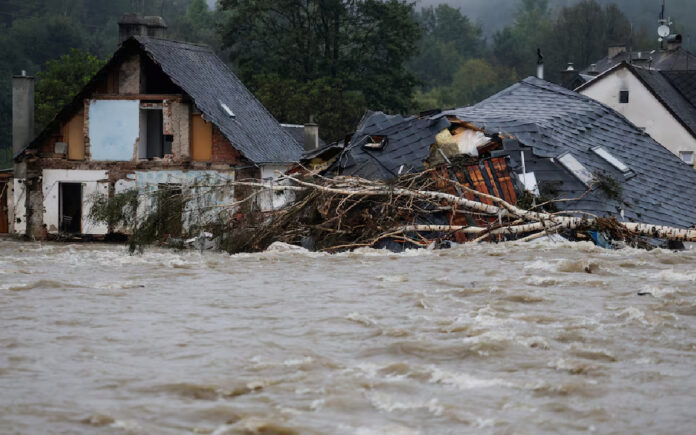Prague: Flooding across central Europe has intensified, with more rivers bursting their banks on Monday. The death toll continues to rise in what is now considered the region’s worst flooding in at least two decades. As some authorities begin to assess the damage, others brace for even higher water levels.
Border areas between the Czech Republic and Poland experienced severe impacts over the weekend. Heavy rainfall and rising water levels, persisting since last week, have collapsed bridges, forced evacuations, and left a trail of destruction. Thus far, the flooding has claimed at least 15 lives across Austria, Romania, and other affected regions.
The Polish government was expected to convene on Monday to declare a state of disaster. In the town of Klodzko, situated along the Czech border, Mayor Michal Piszko reported that although waters had receded, the situation remained critical. “We need bottled water and dry provisions because we have also set up a point for flood victims evacuated from flooded areas,” Piszko told private broadcaster RMF FM. “Children will not go to school until the end of the week. At the moment, half of the city has no electricity.”
Polish Education Minister Barbara Nowacka announced the closure of approximately 420 schools across four provinces due to the floods. Additionally, a hospital in Nysa was evacuated. In the Czech town of Jesenik, located just across the Polish border, residents have begun cleaning up after floodwaters receded, revealing damaged cars and debris scattered across the streets.
Preparation for Further Flooding
While floodwaters began to recede in the Czech-Polish border area on Monday, the flooding has widened, putting larger cities on high alert. Jacek Sutryk, the mayor of Wroclaw, Poland, stated that the city of around 600,000 people was preparing for water levels to peak on Wednesday. “This high wave will pass through Wroclaw for several days,” he warned.
In the Czech Republic, the Morava River’s rising waters have put the city of Litovel, located 230 kilometers (140 miles) east of Prague, largely underwater. The city, with a population of nearly 10,000, had 70% of its area submerged, leading to the closure of schools and health facilities. In Ostrava, the regional capital in northeastern Czechia, flooding has forced the shutdown of a power plant that supplies heat and hot water to the city and two chemical plants.
Across the Czech Republic, more than 12,000 people have been evacuated. Over the weekend, approximately a quarter of a million households were left without power, though that number dropped to 118,000 by Monday, according to the CTK news agency.
Romania reported six flood-related deaths over the weekend. In Austria, an Austrian firefighter lost his life on Sunday. Additionally, two elderly men, aged 70 and 80, were found drowned in their homes in Lower Austria. Polish authorities reported five deaths, while one fatality occurred in the Czech Republic.
Also Read | Ukraine Calls for Global Assistance in Kursk Region Conflict
Danube River Also at Risk
Hungary’s Interior Minister Sandor Pinter assured that the government in Budapest was fully prepared to respond to the flooding. Current efforts focus on keeping the Danube River and its tributaries within their banks, with up to 12,000 soldiers on standby to assist if needed. Both Bratislava, the capital of Slovakia, and Budapest, the capital of Hungary, are preparing for the rising Danube River.
In Austria, river and reservoir levels fell overnight as rainfall eased, but officials are bracing for a potential second wave as heavier rains are forecasted in the coming hours.



